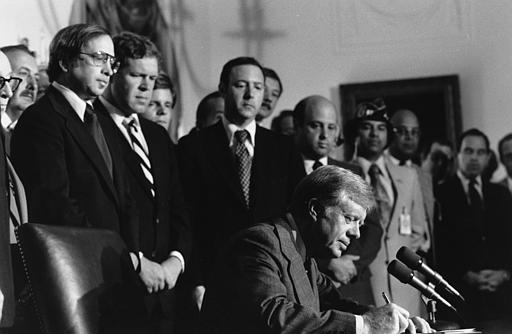The Supreme Court decision in Wayte v. United States, 470 U.S. 598 (1985), dealing with selective prosecution, affirmed a decision by the Ninth Circuit Court of Appeals upholding the government’s passive enforcement policy, whereby it initially only prosecuted individuals who either reported themselves or were reported by others for not registering for selective service.
Government’s prosecution of draft dodgers challenged on First Amendment grounds
Petitioner David Alan Wayte had challenged the policy on equal protection and First Amendment grounds because it prosecuted men who were outspoken about their refusal to register.
Writing for the majority, Justice Lewis F. Powell Jr. reviewed and analyzed the government’s passive enforcement policy since President Jimmy Carter had reinstituted selective service registration in 1980.
Powell rejected Wayte’s constitutional challenges, finding that Wayte failed to show the policy had a “discriminatory purpose.”
Powell observed that government had “broad discretion” over whom to prosecute, although it was not “unfettered.” In this case, he observed that the government had not prosecuted those “who reported themselves but later registered.” Moreover, it did not “prosecute those who protested registration but did not report themselves or were not reported by others.”
Court upheld passive prosecution as furthering a substantial government interest
Citing the test for regulating activities that combined speech and nonspeech activities in United States v. O’Brien (1968), Powell wrote that the government could regulate the latter in cases where such regulation “furthers an important or substantial government interest . . . unrelated to the suppression of free speech . . . [if] the incidental restriction on alleged First Amendment freedoms is no greater than is essential to the furtherance of that interest.”
Focusing on the second of these standards (the only one under dispute), Powell said that “by relying on reports of nonregistration, the Government was able to identify and prosecute violators without further delay.” He observed that “the letters written to Selective Service provided strong, perhaps conclusive evidence of the nonregistrant’s intent not to comply.” He tied such prosecutions to “general deterrence.”
Powell further observed that if the Court were to accept the First Amendment argument, individuals could gain immunity from such prosecution simply by writing letters reporting themselves.
Dissent argued government’s methods targeted those vocally critical of selective service
Justice Thurgood Marshall wrote a dissent, joined by William J. Brennan Jr., in which he argued that the Court should have dismissed the suit after the government refused to provide government documents that the plaintiff had requested at the trial court. Marshall thought this evidence might have provided evidence that the government’s prosecution was specifically intended to target those who vocally criticized the selective service system.
An earlier decision in Rostker v. Goldberg (1981), largely citing the need for deference to congressional judgments relative to the military, had upheld the constitutionality of selective service registration against charges that it violated equal protection component of the Fifth Amendment by applying only to males.
John Vile is a professor of political science and dean of the Honors College at Middle Tennessee State University. He is co-editor of the Encyclopedia of the First Amendment. This article was originally published in 2009.

